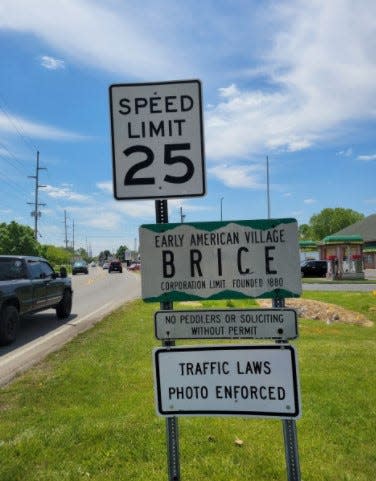Ohio Auditor: Brice village 'is a speed trap ... with no other reason for it to exist'

The Village of Brice's photo-enforced speeding ticket operation, which it says is now suspended, apparently had deeper problems than just a Franklin County judge having found that it operated in complete disregard of state law.
A new state financial audit released Tuesday found that Brice, a village with a 2020 Census population of 93 people, offloaded the ticket-writing operation to two private companies, then failed to adequately oversee that potentially hundreds of thousands of dollars in fines were being collected correctly.
"This tiny village is a speed trap reliant on automated speeding citations to pay the bills. There's no other reason for it to exist," Ohio Auditor Keith Faber said in a written statement.
Village of Brice: Inadequate record keeping for speeding fines, auditor finds
State auditors going over the financial records for Brice for the years 2019 and 2020 "were unable to obtain sufficient appropriate audit evidence supporting the amounts recorded as fines, licenses and permits from camera speed enforcement fines" because of insufficient record-keeping by the village.
The fine receipts were lumped in with revenue collected from licenses and permits, which combined amounted to more than $939,000 total for 2019 and 2020. Those fines and fees represented 81% of the village's general fund revenue for 2019 and 76% of receipts for 2020, the audit found.
That's more than $10,100 in potential fines, licenses and permits collected for every village resident.
"In 2019 and 2020, the village failed to maintain approvals of tickets submitted to (camera-ticketing firms) Brekford Corporation and Blue Line Solutions LLC for the photo speed enforcement program," auditors wrote. "As a result, we were unable to obtain sufficient appropriate audit evidence supporting the amounts recorded as camera speed enforcement fines.
"The village should maintain all approvals of tickets submitted to the companies and establish procedures to help ensure the village's financial statements are accurately presented," the audit report found. "The legality of traffic camera revenues has not yet been determined as a related court case is ongoing."
Brice's speed-enforcement camera use has history of controversy
Brice has been the subject of numerous lawsuits over the years from motorists who were automatically mailed tickets from its photo-enforcement companies demanding payments, even after a 2019 clarification in the legislation by the Ohio General Assembly gave only municipal courts exclusive jurisdiction to adjudicate all speeding citations. Contracts showed Brice's camera firms were taking a 40% cut of the fines off the top.

"It appears that the Village of Brice has completely ignored the current law," Franklin County Municipal Court Judge David B. Tyack wrote in a May 2020 decision, dismissing multiple tickets issued through the village.
Tyack found that Brice should have been filing a certified copy of its civil traffic tickets with Franklin County Municipal Court and paying a required filing fee of $123 each time. By sidestepping that, the village appeared to be avoiding "paying the filing fee to this court, and also to continue to collect revenue illegally through a third-party vendor."
It's unclear if the village could be required to repay any motorists it incorrectly collected fines from — or even if it has the needed information to do that. Some lawsuits against Brice have been dismissed largely on a technicality: the village rescinds the citation before trial, leading courts to find the cases at hand moot before getting to the merits.
"The camera program is currently suspended," the village said in a reply to the auditor's finding that it had incorrectly offloaded its responsibilities to a third-party vendor.
"...But when/if the Village is able to resume the camera program," Brice officials said in their response, they would demand increased transparency from the camera vendor to meet its duties as the agency ultimately responsible for having issued the tickets. Those details would come in special reports that the state auditors have informed the village it should have been receiving all along, but which the village says are now too late to receive for past years.
Brice's current fiscal officer, Patricia Stevens, wasn't available for comment Tuesday.
Julia Evans, fiscal officer in the years audited, is the mother of Brice Village Council president Lori Runyon — one of several familial relationships among officials who run the village, according to the state auditor's office.
Council member Sara Shaw is Evans' niece and a cousin of Runyon. Council member Donn Crawford's wife, Amy, is Evans' daughter and Runyon's sister.
In addition, Brice Mayor John Mathys is the husband of Council member Christy Mathys. And two of the village's six council members who resigned in April 2020, Lisa and Ben Geiser, were husband and wife, the audit noted.
Faber's office said in a media release that a lawsuit on traffic enforcement cameras involving other municipalities is pending before the Ohio Supreme Court. According to court documents, the auditor said, Brice “suspended its use of the traffic law photo-monitoring device as of May 24, 2021.”
Brian Zets, an attorney who has represented the village in numerous court filings involving the photo-enforced ticketing operations, didn't immediately return a call left with his office.
The audit and a separate management letter noted other issues with the village's operation as well:
• Minutes of meetings of the village trustees have insufficiently documented what took place, including why private executive sessions were held, and provided no detail about budget decisions or why $3,000 was transferred in 2019.
• Brice had no formal written policy to demonstrate compliance with the Ohio Public Records Act for 2019 and 2020, but subsequently created one.
• Contrary to Ohio law, the village had expenditures in excess of appropriations in the general fund on Dec. 31, 2020 in the amount of $76,463. In addition, the village's spending exceeded the amount of estimated resources certified as available by the village council and the budget commission in the Street Construction Maintenance and Repair and Surcharge Special Revenue Funds by $6,587 and $19,000, respectively. The village also had a deficit fund balance in the Surcharge Special Revenue Fund of $3,421 on Dec. 31. 2020.
• As of December 31, 2019, the audit found the village had expenditures in excess of appropriations in the general fund and the Surcharge Special Revenue Fund by $239,106 and $2,081, respectively. Appropriations also exceeded the amount of estimated resources certified as available in the Drug Enforcement and Surcharge Special Revenue funds by $250 and $3,604, respectively. In addition, the village had a deficit fund balance in the Surcharge Special Revenue Fund of $4,919, the audit for that year find.
• Five of six findings from a 2018 state audit that questioned the accuracy of Brice's financial reporting, allocation of revenues and other issues originally dating back as far as 2006 were determined to be "not corrected" in this latest 2019-n2020 audit.
wbush@gannett.com
@ReporterBush
Get more political analysis by listening to the Ohio Politics Explained podcast
This article originally appeared on The Columbus Dispatch: Brice 'speed trap': Village photo-enforced fines slammed in audit

